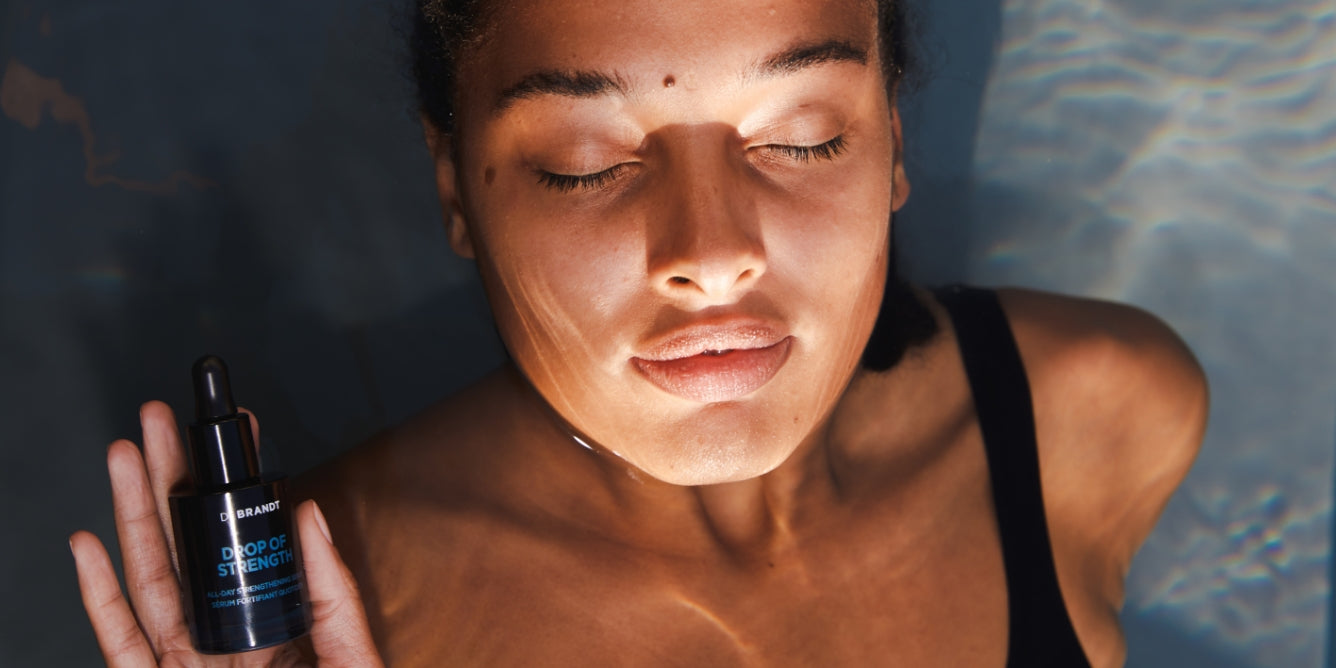
Vitamin C is considered to be a hero ingredient in our everyday lives – from drinking a glass of orange juice or taking vitamin supplements in the morning, to making sure it’s also a key ingredient in at least one of our skincare and beauty products. We called upon experts from our Skin Advisory Board to give us the juice on Vitamin C – what are the real benefits of vitamin C in nutrition and in skincare? Below, Molly Knauer, registered dietitian, and Dr. Shasa Hu, Board-Certified Dermatologist, break it down for us.
Vitamin C and Nutrition
Role of vitamin C in the body
Vitamin C plays many roles in our body. Vitamin C acts as a pure antioxidant, neutralizing free radicals, and can help reduce stress on our cellular function.
When it comes to our skin, vitamin C is crucial for the formation and maintenance of collagen which help with firming and keeps it youthful looking. Vitamin C extract used topically can help brighten skin and reduce dark spots.
What is Vitamin C good for?
Research has shown that individuals who have higher vitamin C intake have lower risk of cardiovascular disease, partly because of the antioxidant properties and also because of the reduction of oxidative stress. Vitamin C may help delay or prevent age related macular degeneration (an eye disease that causes loss of vision) and cataracts. While most of us think of Vitamin C is preventing the common cold, there is no conclusive research on vitamin C and preventing colds. It may however, help reduce the severity of symptoms and length of a cold.
How to add more Vitamin C in your diet?
Humans are unable to synthesize vitamin C so it is an essential part of diet. Adult women are recommended to take 75 mg daily and adult men 90 mg. Vitamin C is found in high amounts in citrus fruits, broccoli, tomatoes, strawberries and melon.

Vitamin C and Wellness
It’s important to care for our bodies from the inside, out, by being mindful of what we put in them and just as important to care for our bodies from the outside, in. Vitamin C plays many roles in maintaining overall wellness. From preventing or providing protection against oxidative cellular damage, cardiovascular disease and its association with a stronger immune system, to its important role in boosting collagen production and reducing dark spots on our skin, it is vital that we get enough vitamin C in our diets and use it topically on our skin.
Vitamin C and Skincare
Vitamin C is one of the most powerful antioxidants in the industry known for its benefits in antiaging and skin beautification. It is safe to use with most skin types and all skin tones.
Numerous studies have supported the function of vitamin C in scavenging or neutralizing reactive oxygen species triggered by sun exposure, subsequently reducing the stress on our skin’s cellular function. Vitamin C is also a vital component in formation and maintenance of collagen. In fact, scurvy is a disease where lack of vitamin C in the patients manifests as thin, easily bruised skin, bleeding gums and abnormal hair. Because of the awareness of the importance of vitamin C in collagen and skin health, scurvy is rarely diagnosed in the modern world.
Beyond its vital function in supporting healthy skin, topical vitamin C is one of the most popular active ingredients in skin care for multiple benefits on rejuvenation, radiance and brightening. Topical vitamin C helps to brighten complexion, diminish the appearance of dry skin, reduce dark spots, boost skin’s defense against UV damage, and improve the appearance of fine lines and wrinkles through collagen production.
What are the different forms of Vitamin C existing?
Most of the topical vitamin C preparations contain L-ascorbic acid or naturally derived vitamin C from fruit/botanical extracts. L-ascorbic acid is probably the most commonly used and considered to be most biologically active. L-ascorbic has several limitations due to its hydrophilic (water soluble) and unstable nature. These limitations are why vehicles for L-ascorbic acid in serums or antiaging lotions typically are of low pH (less than 3.5). The lower pH improves the stability and permeability of L-ascorbic acid; however, the lower pH also can lead to irritation in those with sensitive skin.
Two other common topical formulations of vitamin C include ascorbyl-6-palmitate and magnesium ascorbyl phosphate (MAP). Both ascorbyl-6-palmitate and MAP are lipid-soluble (lipophilic), esterified forms of vitamin C, which are stable at a neutral pH. Disodium isostearyl 2-0 L-ascorbyl phosphate, ascorbic acid sulphate, and tetraisopalmitoyl ascorbic acid are also more stable, esterified analogs of vitamin C used in skin care, but as bioactive as L-ascorbic acid. Tetrahexyldecyl (THD) ascorbate is a newer vitamin C analog gaining a lot of attention. Similar to the more lipophilic and stable analogs, THD does not require low pH in topical formulation. In fact, studies have shown that THD ascorbate has superior stability to L-ascorbic acid, and improved penetration to dermis.
Which type of vitamin C is best?
It is impossible to select one type of vitamin C over the others as the best, since the final results on the skin depend on multiple factors such as the pH of the formulation, photoprotective packaging to maintain stability, vehicle for penetration and user’s experience and adherence. The concentration of vitamin C also matters, making comparison more difficult. THD Ascorbate is the more stable form of Vitamin C as it is oil-soluble. Skincare products formulated with THD Ascorbate can easily be applied with other skincare products while keeping its potency and can still effectively penetrate the skin.
What are the Vitamin C benefits for your skin?
As one of the most potent antioxidants, topical vitamin C in a daily routine can help to reduce the appearance of sun damage such as brown spots, fine lines and dull complexion. Topical vitamin C will also help boost skin’s natural collagen production and skin’s natural defense again UV damage, thereby improving skin elasticity and barrier function. Another function of vitamin C is to help replenish vitamin E in our skin. Vitamin E is another key antioxidant that helps to protect our skin cells against oxidative stress from sunlight and maintain the collagen in the skin. When used with daily SPF 30 or greater, vitamin C will help to lighten hyperpigmentation by inhibiting tyrosinase – a key enzyme in the production of melanin.
Mixing hyaluronic-acid products with vitamin c in your skincare routine can form a more potent formula to increase results against signs of aging.
Which skincare products contain Vitamin C?
Vitamin C can be added into your anti-aging skin care routine in either the morning or evening, or twice a day, in face serums, brightening gels, eye creams, or moisturizers. Most vitamin C formulations are in a liquid serum form because serums facilitate concentrated delivery of vitamin C to the skin. Brightening creams and hydrating lotions containing vitamin C work best when combined with a broad-spectrum SPF 30 or higher. For people with sensitive skin, vitamin C analogs such as THD ascorbate will be more easily tolerated. I highly recommend starting with a vitamin C serum or lotion in the morning, followed by a broad- spectrum sunscreen, for a few weeks. Once your skin gets used to the vitamin C, you can then add vitamin C to your evening skincare, and even pair it with a retinol product. If your skin becomes red or feels tight or tingling after vitamin C, you may need to switch to a lower concentration formula or decrease use to every other day. With persistent redness or irritation, it is best to see a dermatologist to rule out potential allergy to one or more ingredients in your vitamin C product.
Discover our NEW C Scription Vitamin C Brightening Serum with 20% THD Ascorbate






Leave a comment (all fields required)